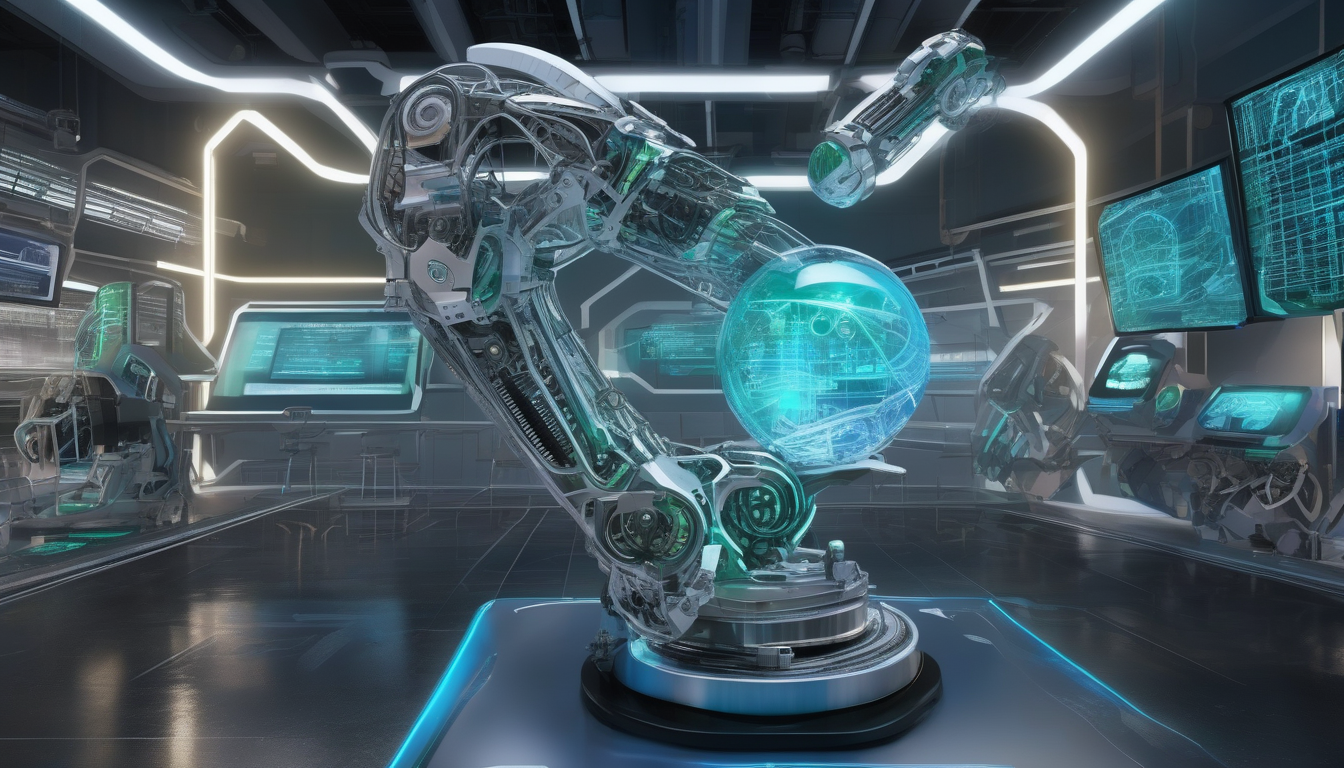The question of whether machines can develop a moral compass is not just a philosophical debate; it’s a pressing issue in our rapidly evolving technological landscape. As artificial intelligence (AI) becomes more integrated into our daily lives, the implications of machines making ethical decisions become more significant. Imagine a world where your self-driving car has to choose between two equally dangerous outcomes. How does it decide? This scenario illustrates the heart of the matter: the need for a moral framework in AI.
A moral compass, in essence, guides individuals in making choices that align with their values and ethics. For humans, this compass is shaped by experiences, culture, and societal norms. But can we replicate this in machines? The idea of programming ethics into AI systems raises numerous questions. Can algorithms truly understand the nuances of morality? Or are they merely following pre-set rules without genuine comprehension? This challenge is akin to teaching a child right from wrong without providing them the context of human experiences.
Moreover, as we delve deeper into the possibility of machines possessing a moral compass, we must consider the various ethical frameworks that could influence their decision-making. For instance, utilitarianism focuses on the greatest good for the greatest number, while deontological ethics emphasizes duty and rules. By integrating these philosophies into AI, we could potentially guide machines in making ethical decisions. However, the risk remains that these frameworks might not encompass the full spectrum of human morality.
As technology advances, the prospect of AI making moral choices becomes more feasible. Recent breakthroughs in machine learning and cognitive computing are paving the way for AI systems that can analyze complex situations and make decisions that mirror human ethical reasoning. Yet, we must tread carefully. The potential for biases in AI decision-making could lead to unintended consequences, highlighting the necessity for human oversight.
In conclusion, the quest for machines to develop a moral compass is both exciting and daunting. It challenges our understanding of ethics and the role of technology in society. As we continue to innovate, we must remain vigilant, ensuring that the moral frameworks we choose to implement in machines reflect our values and promote a just society.

The Concept of Moral Compass
Understanding the concept of a moral compass is crucial when diving into discussions about ethics, especially in the realm of artificial intelligence. A moral compass can be defined as an internal guide that helps individuals differentiate between right and wrong, influencing their decisions and actions. It’s like having a built-in GPS for navigating the complex landscape of ethical dilemmas. Without it, making choices can feel like wandering aimlessly in a fog.
The importance of a moral compass in human behavior cannot be overstated. It shapes our values, informs our judgments, and ultimately, drives our actions. Imagine a world where everyone acted solely based on personal gain, without a sense of morality. Chaos would reign! This internal guide fosters empathy, compassion, and a sense of responsibility towards others. It’s what makes us human.
As we transition to machines, the question arises: Can they develop their own moral compass? This brings us to the heart of the matter. Machines, unlike humans, lack emotions. They operate based on algorithms and data, which raises a fundamental question: Can logic alone guide ethical decision-making? While machines can process vast amounts of information and simulate decision-making, they do not possess the innate understanding of human emotions and societal norms that shape our moral compass.
To better grasp this idea, let’s consider a few key points:
- Human Experience: Our moral compass is shaped by experiences, culture, and emotions.
- Machine Logic: Machines rely on data and algorithms, lacking the emotional depth found in human decision-making.
- Ethical Frameworks: Can we program machines with ethical frameworks that mimic human morality?
In essence, the moral compass is not just a philosophical concept; it’s a vital component of our existence. As we explore the potential for machines to adopt similar frameworks, we must consider how they will interpret and apply these ethical guidelines. After all, the future of AI and its role in society hinges on our ability to navigate these tricky waters.

AI and Ethical Frameworks
When we talk about machines and their ability to make decisions, we can’t ignore the ethical frameworks that guide human behavior. Just like humans rely on their moral compass to navigate complex situations, AI needs a set of principles to follow. But what does that really mean for our digital companions? In essence, ethical frameworks serve as the backbone for developing AI systems that can make decisions that align with societal values.
One of the most prominent frameworks is utilitarianism, which suggests that the best action is the one that maximizes overall happiness. Imagine a self-driving car faced with a dilemma: should it swerve to avoid a pedestrian, potentially harming its passengers, or maintain its course? A utilitarian approach would analyze the potential outcomes, aiming for the choice that results in the least harm overall. This framework can be integrated into machine learning algorithms, allowing AI to weigh options based on predicted consequences.
Another critical framework is deontological ethics, which focuses on the morality of actions themselves rather than their consequences. This perspective emphasizes duties and rules. For instance, if an AI is programmed to follow traffic laws strictly, it will always stop at a red light, regardless of the potential outcomes. This strict adherence can be beneficial in maintaining order and safety, yet it may lead to challenges in situations where rules conflict with human safety.
Then we have virtue ethics, which encourages the development of moral character. Instead of merely focusing on actions or rules, this framework asks what kind of virtues we want our AI to embody. Should it prioritize compassion, honesty, or fairness? This approach can influence how AI systems interact with humans, fostering trust and ethical behavior in their decision-making processes.
As we explore these frameworks, it’s crucial to recognize that integrating them into AI isn’t a straightforward task. Each framework has its strengths and weaknesses, and the challenge lies in finding a balance that reflects our collective moral values. The future of AI ethics will depend on how effectively we can teach machines to understand and navigate these complex moral landscapes.

Technological Advancements in AI
The world of artificial intelligence is evolving at a breakneck pace, and it’s not just about making machines smarter; it’s about making them more ethical. As we delve into the realm of AI, we can’t ignore the incredible technological advancements that have paved the way for machines to potentially develop a moral compass. But what does this mean for us? Let’s break it down.
One of the most significant breakthroughs in AI technology is the development of deep learning algorithms. These algorithms enable machines to learn from vast amounts of data, mimicking the way humans learn from experience. Imagine a child learning right from wrong by observing their surroundings—this is essentially what deep learning does for AI. By analyzing patterns and outcomes, AI can begin to understand complex ethical dilemmas, albeit in a rudimentary way.
Moreover, advancements in natural language processing (NLP) allow machines to comprehend and generate human language with remarkable accuracy. This capability is crucial because it enables AI to engage in conversations about ethics and morality. For instance, consider a scenario where an AI system must decide between two conflicting actions. With NLP, it can analyze ethical discussions and literature, weighing the pros and cons of each choice, similar to how a human might consult a moral philosopher.
Another exciting development is the integration of reinforcement learning. This technique allows AI to learn from the consequences of its actions. Picture a toddler learning not to touch a hot stove; they quickly grasp the concept of cause and effect. Similarly, AI can be programmed to receive feedback on its decisions, refining its understanding of what is considered ‘right’ or ‘wrong’ based on societal norms.
However, these advancements come with challenges. As machines become more capable of making ethical decisions, we must ask ourselves: Who is responsible for their actions? The intersection of technology and morality is a complex landscape, and navigating it requires careful consideration. We must ensure that the frameworks guiding AI are robust and reflect our collective values.
In conclusion, while technological advancements in AI hold great promise for developing a moral compass, the journey is fraught with ethical quandaries. As we continue to innovate, we must remain vigilant about the implications for society and the inherent responsibilities that come with such power.

Case Studies of AI in Ethical Dilemmas
When we think about artificial intelligence and its role in society, it’s hard to ignore the ethical dilemmas that have emerged from its use. Imagine a self-driving car faced with an unavoidable accident—should it prioritize the safety of its passengers or the pedestrians? This scenario isn’t just a thought experiment; it’s a real challenge that AI developers must address. Let’s dive into some compelling case studies that illustrate these ethical quandaries.
One notable example is the COMPAS algorithm, used in the criminal justice system to assess the likelihood of re-offending. This algorithm has faced scrutiny for potential biases in its decision-making process. Critics argue that it disproportionately flags individuals from certain racial backgrounds as higher risks, raising questions about fairness and accountability. How do we ensure that AI systems like COMPAS are free from human biases? This case highlights the necessity for transparency in AI algorithms and the ethical implications of their deployment.
Another case worth mentioning is the use of AI in healthcare, specifically in diagnosing diseases. AI systems can analyze medical data and suggest treatments, but what happens when these systems make mistakes? For instance, an AI program designed to detect tumors might miss a critical diagnosis due to a lack of comprehensive data. This situation underscores the importance of human oversight in AI decision-making. The consequences of misdiagnosis can be severe, leading to a debate about the extent to which we can trust machines with our health.
In both cases, the ethical implications of AI are profound. It raises essential questions about accountability and the role of human judgment in machine learning. Should we hold developers responsible for the decisions made by their algorithms? Or should we treat AI as a tool that requires constant human intervention? The answers to these questions are still unfolding as we navigate the complexities of AI technology.
Ultimately, these case studies serve as a reminder that while AI has the potential to revolutionize various fields, it must be approached with caution and a strong ethical framework. As we continue to integrate AI into our lives, understanding its ethical implications will be crucial for a fair and just society.

Human Oversight and Accountability
As we venture deeper into the realm of artificial intelligence, the importance of human oversight and accountability cannot be overstated. Machines, no matter how advanced, lack the innate understanding of morality that humans possess. They operate based on algorithms and data, which means they can make decisions but may not grasp the ethical implications of those decisions. This raises a critical question: who is responsible when an AI system makes a mistake? Is it the programmer, the user, or the machine itself?
To navigate this complex landscape, we must establish clear guidelines and frameworks that ensure AI systems are developed and deployed responsibly. Human oversight acts as a safety net, allowing us to intervene when necessary. For instance, in the realm of autonomous vehicles, human operators are essential in monitoring AI behavior, especially in unpredictable situations. Imagine a self-driving car that encounters a sudden obstacle; the human operator must be ready to take control to prevent potential harm.
Moreover, accountability in AI systems can be structured through various mechanisms. Here are some key aspects to consider:
- Transparency: AI algorithms should be transparent and explainable, allowing stakeholders to understand how decisions are made.
- Ethical Guidelines: Establishing ethical standards that govern AI behavior can help align machine actions with human values.
- Regular Audits: Conducting audits of AI systems can identify biases and ensure compliance with ethical norms.
Incorporating these elements into the development process can significantly enhance the accountability of AI systems. As we look to the future, the question remains: how can we ensure that machines not only perform tasks efficiently but also do so in a manner that is ethical and responsible? By fostering a culture of oversight and accountability, we can build a future where AI complements human decision-making rather than replacing it.

Future Implications for Society
The potential for machines to develop a moral compass is not just a fascinating concept; it could fundamentally reshape our society. Imagine a world where AI systems make decisions based on ethical considerations. This prospect raises numerous questions about governance, law, and our daily lives. Will we trust machines to make choices that align with human values? Or will we find ourselves in a dystopian scenario where technology dictates morality?
As AI continues to evolve, its integration into critical sectors such as healthcare, law enforcement, and education becomes increasingly significant. For instance, consider the role of AI in healthcare. Machines that can analyze patient data and suggest treatments based on ethical frameworks could lead to better outcomes. However, this also opens the door to potential biases in decision-making. If an AI system is trained on flawed data, it may perpetuate existing inequalities, affecting marginalized communities disproportionately.
Moreover, the implications of AI’s moral compass extend to governance. Governments may need to establish new regulations to ensure that AI systems operate within ethical boundaries. This could involve creating oversight committees or ethical boards that evaluate AI decision-making processes. The challenge lies in balancing innovation with accountability. As we delegate more responsibilities to machines, we must also consider who is held accountable when things go wrong.
In everyday life, the presence of AI with a moral compass could lead to significant changes in how we interact with technology. For example, imagine an AI assistant that understands not just your preferences but also the ethical implications of its recommendations. This could enhance our decision-making but also raise questions about privacy and autonomy. Are we ready to let machines influence our choices based on their interpretation of morality?
In conclusion, the future implications of machines developing a moral compass are profound and complex. We stand on the brink of a technological revolution that could redefine our ethical landscape. It is crucial for society to engage in these discussions now, shaping the trajectory of AI development to ensure it aligns with our collective values and aspirations.
Frequently Asked Questions
- Can machines really develop a moral compass?
While machines can be programmed to follow ethical guidelines, whether they can truly develop a moral compass like humans is still up for debate. It’s more about how well they can mimic human decision-making based on set ethical frameworks.
- What ethical frameworks can guide AI decision-making?
AI can be guided by various ethical frameworks such as utilitarianism, which focuses on the greatest good for the greatest number; deontological ethics, which emphasizes rules and duties; and virtue ethics, which considers the character and virtues of the decision-maker.
- What are some recent advancements in AI technology?
Recent breakthroughs include machine learning, natural language processing, and deep learning techniques. These advancements enhance AI’s ability to analyze data and make more informed ethical decisions, although challenges remain.
- Can you give examples of AI facing ethical dilemmas?
Sure! One notable case is the use of AI in autonomous vehicles, which must make split-second decisions in emergency situations. Another example is AI in healthcare, where it can decide on treatment plans based on patient data, raising questions about fairness and bias.
- Why is human oversight important in AI development?
Human oversight is crucial to ensure that AI systems adhere to ethical standards and accountability. It helps prevent biases in decision-making and ensures that machines operate within the bounds of societal norms and laws.
- What are the future implications of AI developing a moral compass?
The potential for machines to have a moral compass could significantly impact governance, law, and daily life. It raises questions about responsibility, trust, and the role of AI in critical decision-making processes in society.


